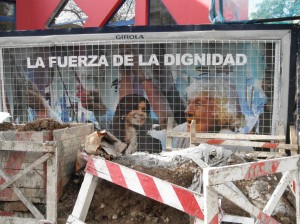Under first Nestor, and then Cristina, Kirchner, Argentina has been pursuing an economic policy that, in its suspicion of free markets, distrust of globalization and strong redistributionist vein, reflects a long Argentine tradition that extends far beyond the Kirchner camp, and, indeed, finds some reflection in some of the pronouncements of, ahem, one rather prominent Argentine now resident in the Vatican.
So how’s it working out?
The Guardian reports:
Following the sudden collapse in the peso this week, some Argentinians fear their country may be lurching into a new episode of the crises that seem to hit the country’s economy almost every decade. Scrambling to protect the country’s perilously low central bank reserves, which dropped 30% last year and fell below $30bn (£18bn) this month, the government of President Cristina Fernández de Kirchner seemed at a loss how to proceed. It started the week introducing tight controls on the purchase of online goods from abroad, to prevent Argentinians from spending dollars in ever larger quantities – especially on Chinese products which, as a result of 30% inflation, can be cheaper delivered to their door from abroad than bought at local stores.
But on Friday the government seemed to do a U-turn, saying it would relax its grip on the dollar. From next week it will remove some of the controls it introduced two years ago which banned Argentinians from trading their pesos for dollars, a customary practice in a country with a long history of inflation.The dollar freeze paralysed the property market, which operates in dollars, but failed to stem the rush away from the peso. Instead it created a black market where the dollar has risen from eight to 13 pesos in the last year while the central bank continued using – and losing – reserves trying to keep the dollar in check. Its battle was ultimately lost this week in view of the peso’s sudden collapse.
Seemingly oblivious to the country’s economic plight, Fernández has referred to the last 10 years – since her husband assumed Argentina’s presidency in 2003, and she took over in 2007 – as the “victorious decade”. But this week’s forced devaluation of the official exchange rate may make it difficult to continue repeating a slogan habitually used in speeches by government officials, printed on billboards and even emblazoned on a recent series of commemorative stamps.
To 68-year-old Aida Ender, after 40 days without power in her eighth-floor apartment in the middle-class neighbourhood of Almagro in Buenos Aires, the slogan grates like a bad joke. “There’s no plan, the president is out of touch with reality, she’s lost like Alice in Wonderland,” says Ender, who has had to move out of her apartment, where she has had no water, no working lift and no refrigeration since 16 December. Her plight is shared by thousands of neighbours and even hospitals, in the middle of unusual summer highs of close to 40C. Economic observers blame the government’s populist policies – including keeping utility prices artificially low to disguise inflation – for the power crisis. They say this has made it impossible for firms to invest in maintaining power lines.
The government denies the charges and says that inflation is fuelled by anti-government businessmen.
…At least 11 people were killed and hundreds injured last month when a wave of supermarket looting spread across Argentina, fuelled by a combination of rising food prices and a police strike for higher wages.
The Economist adds:
As of Monday January 27th, the government will supposedly lift this invisible “clamp”. Today’s announcement by Jorge Capitanich, the cabinet chief, lasted only a minute and left his audience with more questions than answers. He revealed only that the exchange restrictions will be lifted for individuals, not for businesses; and that Argentines will still need to present tax affidavits along with their requests for dollars. Those making dollar purchases for travel will be charged a 20% tax advance on such purchases, down from 35% now.
One explanation for the events of the past week is that the authorities can no longer afford to prop up the peso by using Central Bank reserves. Although the 2011 dollar restrictions succeeded in stanching capital flight, they failed to stop the fall of Argentina’s international reserves. In 2011, when the clamp was implemented, the reserves were around $47 billion. They have since dropped below $30 billion. With an energy bill of $15 billion and debt obligations of $10 billion to pay this year, the Central Bank cannot endure much more pressure.
On the other hand, letting the peso plummet as Argentines rush to swap their money into dollars could quickly lead to panic. Even if the Central Bank stops intervening, AFIP, Argentina’s tax agency, will continue to control dollar sales, meaning Argentines could still face rejection of their exchange requests without explanation. Despite this morning’s announcement several black-market exchange houses in Buenos Aires, unsure of what the next week might bring, are still hungrily buying and selling at a rate of roughly 12 pesos to the dollar, well above the official rate of 8.1.
But at least Argentines are being spared the horrors of the free market!

